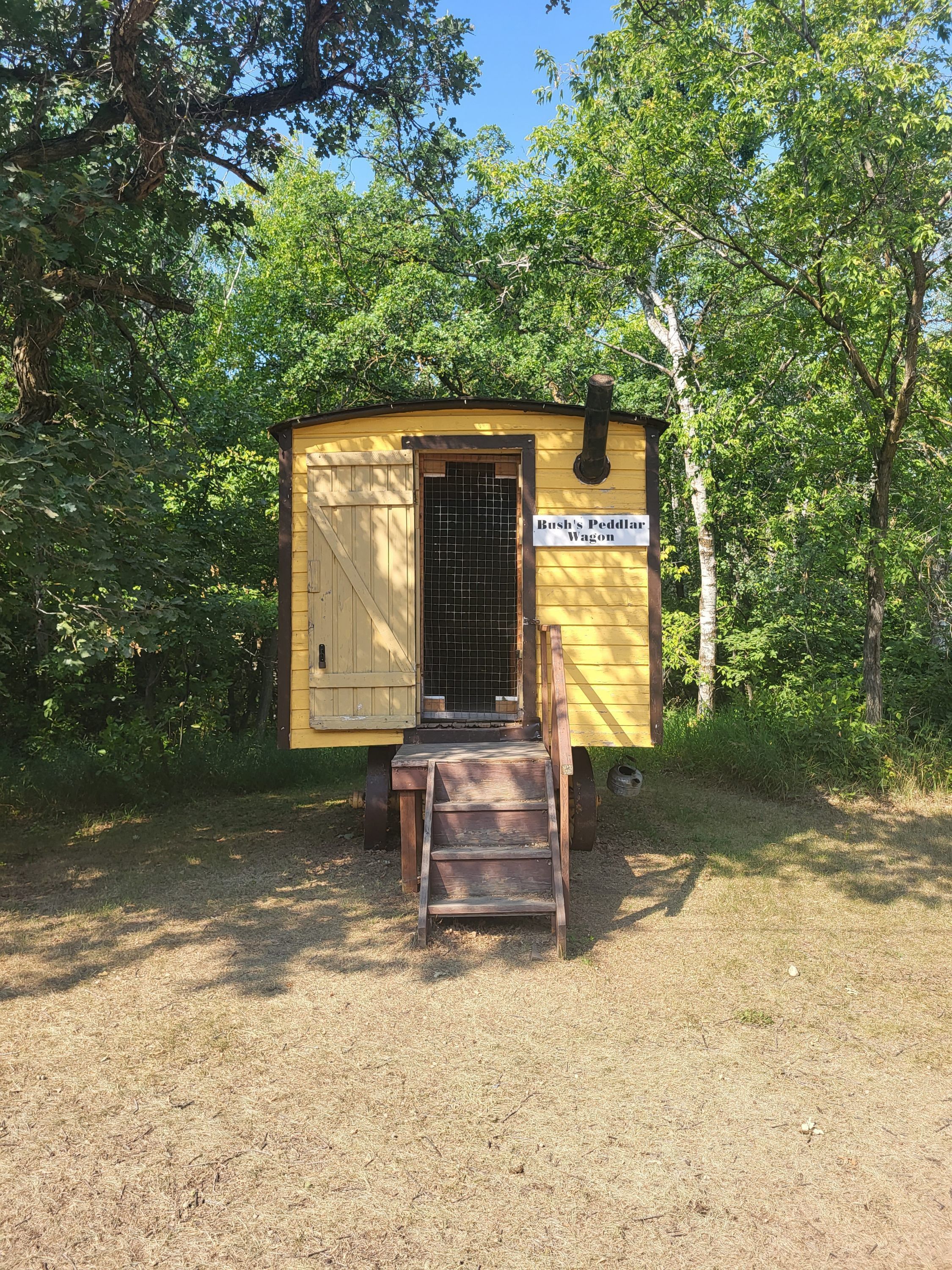Name/Title
Bush's Peddlar WagonDescription
The Contribution of the Jews to the Opening and Development of the West
by Abraham J. Arnold
Peddlers and Storekeepers:
Jewish land settlement in western Canada began in the 1880s after the start of immigration from eastern Europe.
The difficulties of the Jews in Poland, Russia and other Russian dominated countries which led to the mass migration movement began with the partition of Poland in the second half of the 18th century. The Polish Jews were in dire economic straits even before the partitions began. When 2,000,000 Jews of White Russia, Lithuania and Poland came under Russian rule they soon began to encounter restrictions and persecution. In 1791, the "pale" of settlement was established by which White Russian Jews were prohibited from moving to the interior of Russia. This was later extended to several provinces of the Ukraine, Lithuania and other districts.
Many of the Jews who started out as peddlers in Western Canada also had a difficult time. In the pioneer years of the opening of the west from 1882 onward the itinerant peddler was hardly better off than the homesteader. Keeping on the move however included at least the illusion of doing something to improve himself and also the hope that beyond the next turn in the trail one might sell, or barter, some item to advantage. If a peddler had to depend on sales to far-flung homesteaders and the homesteaders suffered a crop loss, what could the peddler sell them. Added to this was the distinctly unfriendly attitude of certain government officials and politicians, some of whom talked about peddlers almost as though they were the outcasts of society.
In 1894 and again in 1895 "Jew Pedlars" became the subject of debate in the House of Commons. On both occasions the matter was raised by Joseph Martin, Liberal M.P. from Winnipeg. Mr. Martin charged that the government had paid for "the transportation of a number of Jew Pedlars from Chicago to Calgary." He claimed that the Department of the Interior had brought "a number of settlers to Calgary, presumably with the intention of locating upon farms ... while as a matter of fact, it appeared that those persons were Jews whose occupation in life had been that of peddling and that instead of coming as settlers to take up farms, those persons, after they had been brought out at a large expense to the Government, had resumed their occupation of peddling, and a number of them had found their way in a short space of time into the Calgary jail ..." [55] Mr. Martin's harangue about "Jew Pedlars" took up five pages of Hansard.
Replying to Martin, the Minister of the Interior, Mr. Daly, stated: "I think the House has arrived at the conclusion that it is a matter of indifference to the Hon. Gentleman how many Jews may have been brought to Calgary so long as he has an opportunity to get a fling at me. I am the Jew he is after ..." "... I think that three times in the course of his speech, the Hon. Gentleman repeated that we had brought in Jew Pedlars, that they were not farmers, and that most of them were incarcerated in the Calgary jail: and it turns out that only one was incarcerated and for an offence not against any of the old settlers but against one of his fellow countrymen ..." [56]
Some pedlars succeeded in overcoming all the hardships of the pioneer days and eventually became merchants and general store proprietors. One of these was the first permanent Jewish settler in Calgary, Jacob Lion Diamond, who started out from Ontario and peddled his way westward for several years until he arrived in Cowtown in 1888. [57]
Many Jews pioneered in the commercial development of the West. In towns and villages throughout the prairies the first store was often opened by a Jewish merchant. It was invariably a general store which became an important community institution in the decades when communication was still fairly primitive. Many Jewish general store operators came to play a role sometimes more important than their function as merchants. The Jewish general store proprietor could usually speak several languages of the old country. He therefore began to serve his customers not only with needed merchandise but as a translator in dealing with the government, as a postmaster and generally as a centre for the exchange of community news and information. [58]
Today the general store operator, like the homesteader, has virtually disappeared. The homesteader was gradually forced out, first by the difficult years of the depression and later, by the mechanization which led to large scale industrial farming. The general store proprietor has been displaced by the supermarket and the department store. While there are still some Jewish storekeepers in Western towns, their numbers have dwindled as the chain stores and supermarkets spread everywhere.
The Jewish population in Western Canada did not grow appreciably until after 1901. In Manitoba, for example, there were only 31 Jews in 1881. After the arrival of the first 340 refugees in 1882 the number increased to 791 by 1891; and to 1,514 by 1901. Then there began a period of rapid increase: to 10,741 in 1911; to 16,669 in 1921 and to 19,341 in 1931.
MHS Transactions, Series 3, Number 25, 1968-69 season
Retrieved from http://www.mhs.mb.ca/docs/transactions/3/jewsandwest.shtml
